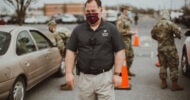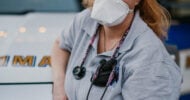On this particular day, my heart rolled off my arm and crashed on the cold exam room floor. I summoned the strength—from where? I don’t know. Ginny cried, and between sobs, she described a brain tumor, the one that left him in a bed for a year. I handed her two tissues (one was never enough) and heaved my stool forward. I wrapped my entire arm around her as tears poured off her nose and distorted the phone screen. I glanced down and saw a college kid, her grandson, one who was bald and, honestly, looked my age. Our legs touched, and now that I was flush against her chair, I felt her warmth. I rubbed Ginny’s back and rested my big, balding head on her shoulder. I didn’t say a word; I simply sat as a witness. Whatever else was the reason for her visit, it didn’t matter. Did anything else—could it possibly—matter?
Ginny had sailed bravely for a long time and couldn’t go any farther. Acutely aware of her pain, I sat silent, honored by her trust. The heft of my head remained perched on her shoulder. I wanted her to know that I was a harbor and it was safe to drop her anchor. With no more wind, she ran aground and then threw everything overboard.
These moments happened to me. Or, more accurately, I existed in a space where these moments were possible. Given what I know today about our universal need for emotional safety, I strived to cultivate the one that lived in my office. And, to complicate matters further, I have doubled down, figuratively speaking, on keeping my heart enmeshed in my hand. Failing to do so would be turning my back on the reason I became a doctor in the first place.
My hands, fine-tuned and sensitive, are my preferred instruments to practice medicine. From the perfunctory office handshake to the hug-and-cry described above, my hands are where my doctoring resides. My skills are offered, or more correctly, given to the world when I roll up my sleeves.
“I wear my heart on my sleeve.” This folksy expression used to puzzle me, as I was never sure what it meant exactly. But now, I know how it applies to the kind of doctor I am. By helping others, I keep getting hurt in the process, a fact I didn’t appreciate until recently.
Being emotionally available for my patients is a daily commitment. When I rolled up my sleeves and got to work, I exposed my heart, the organ I long ago plucked from my rib cage, where it was safe, and I stuck it out on the sleeve of my lab coat.
This was a dangerous yet calculated move on my part. When my heart was available to others, I tapped into the highest calling of my profession. Over twenty years, I have learned that what my patients really wanted, truly deeply yearned for, was my compassion. Of course, they also—obviously—wanted me to be a competent doctor. But, as a master of internal medicine, I spend most days pouring more compassion into my practice.
Am I obsessed with wearing my heart on my sleeve? Maybe so, as I am constantly reminded when I wash my hands, put on my coat, and examine a patient. These are examples of my hands in action, a reminder to connect the love inside me to the person before me.
There have been times in my career when I purposefully pulled back when I was a casualty of health care’s trauma. This happened frequently during COVID-19, when I struggled to preserve my sanity.
I took such a physical and emotional beating during our lives with COVID that I sometimes shut down the pieces of me that cared; my tap of generosity shut off. I was angry then—for so many reasons—and I knew that my decision produced C+ health care. To be completely honest, I didn’t care, as I had to survive. I’m not proud of this decision, but given the circumstances, I’m not ashamed either.
So—my heart lives on my sleeve only when and if I allow it to reside there. As a survivor of the pandemic, a doctor A.C., After COVID, I cannot hide my heart inside my chest and pretend like I earned some kind of free pass. Just the opposite is true, actually. The pandemic delivered so much trauma in our lives that my heart-on-sleeve model is—I know for sure—needed now more than ever. I have a lightness inside me these days, the kind that only comes from survivorship. I make my heart available to celebrate, congratulate, commiserate, mourn, and counsel. I am still scared with my heart down by my hand, but I am wise enough to keep it there and brave enough to accept the risk.
Ryan McCarthy is an internal medicine physician.
























![AI censorship threatens the lifeline of caregiver support [PODCAST]](https://kevinmd.com/wp-content/uploads/Design-2-190x100.jpg)
